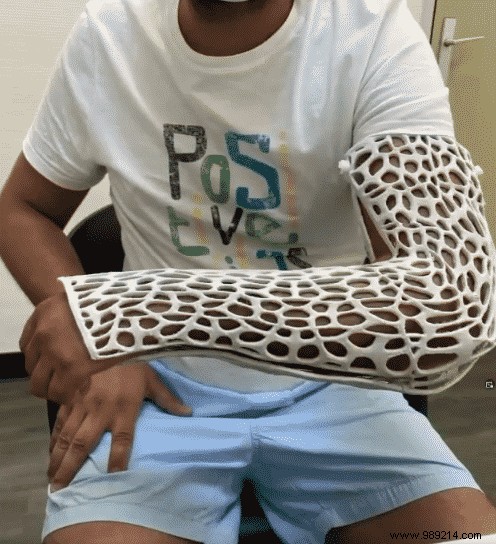At the last CES 2022 show, a French company presented 3D printed splints, an alternative to the usual casts. Several hundred people have tested these light, radiolucent and customizable splints.
The Consumer Electronics Show (CES) took place in Las Vegas from January 5 to 8, 2022. The show therefore physically opened its doors this year, unlike the 2021 edition. On the other hand, this essential tech event was somewhat deserted by visitors, the organizers having reinforced anti-Covid health measures and thus bet on distancing. Nevertheless, CES 2022 remains a real success for French start-ups since 140 of them took part in the show. Among these young companies, we find Skincasts based in Arles. It is one of the fifteen start-ups selected by the South Region to participate in the CES.
In collaboration with the Vr'tig.0 studio, Skincasts designs splints in polylactic acid (PLA), an alternative to the usual plasters. 3D printing makes it possible to made to measure and customize the splints. In addition, the latter are not visible on the x-ray (radiolucent), light and free the adjacent joints. They also benefit from good ventilation and allow the person to go in the water. Thus, maceration constraints, and therefore odors, as well as movement characterizing traditional plasters are absent here.

Crafting begins with a scan of the traumatized body part. Then the file is imported into computer-aided design (CAD) software. The impression of the splint takes about four hours , a period of time that may vary depending on the size of the object. On the material side, polylactic acid is a thermoplastic obtained from renewable resources such as tapioca roots, corn starch or sugar cane. Thus, the splints are biodegradable and recyclable , an important characteristic given the challenge of protecting the environment. In addition, the Health Insurance in France covers these splints up to 60% , the rest to be borne by the patient.
Let's also mention the fact that the Skincasts company is counting on CES 2022 to find technical, scientific and financial partnerships in order to develop internationally> especially in North America. Finally, the start-up has already allowed hundreds of patients to test its technology in order to support its development.
Here is a video presentation of the splints that Skincasts manufactures: